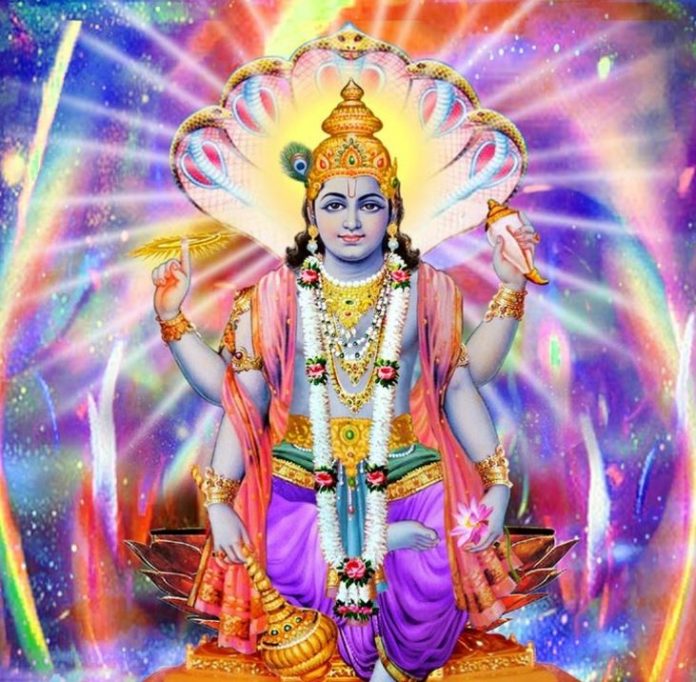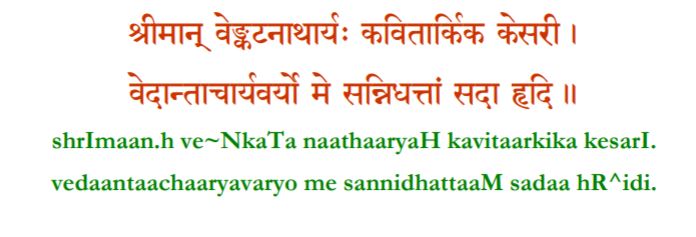

- 15 December 2021, Plava varusha, Karthikai -29, Wednesday;
- SLOKA-13:
- PARADEVATHA PARAMARTYADHIKARAM: 6TH CHAPTER OF SRIMATH RAHASYA THRAYA SAARAM
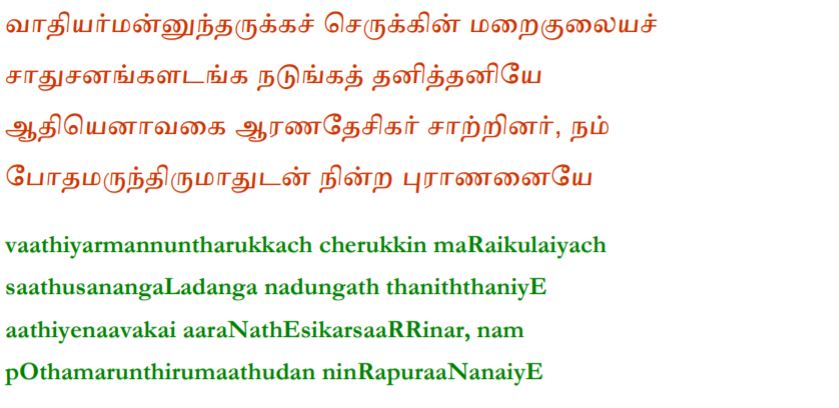
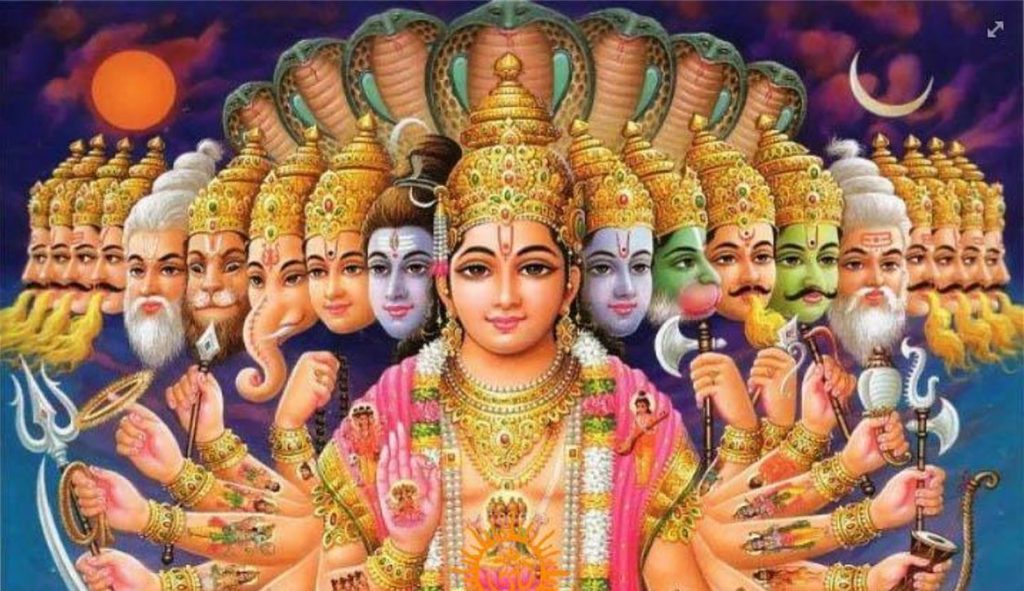
MEANING:
The distortions and the ill-informed were dizzy with their egos rooted in the knowledge of Tarka Saasthrams. Driven by their egos, they argued that BrahmA or IndhrA and others bound by their KarmAs were responsible for the origin of the Universe; those arguments made the Vedams and the saadhu janams shudder. The babble of these egotists were not based on any accepted pramANams. Our AchAryAs being fully conversant with the true inner meanings of VedAntham countered these babblings and established with the help of PramANams firmly that SrIman NaarAyaNan is the fundamental kaaraNam for the origin of the Universe and its beings.
The key words of this Paasuram are: “aaraNa Desikar pOthu amarum Thiru Maadhudan ninRa namm PurANanayE sARRinar” (Our VedAnthAchAryAs established that our Lord standing with His divine consort, Mahalakshmi as the Jagath KaaraNan).
The key passage from the Sanskrit rendition of this Paasuram in SrImath Rahasya Thraya Saaram is: “Jagathi parichitha nigamAnthA: yEka: janthu SRISAHAAYAM GATHIM PASYATHI” (In this world, one who is conversant with VedAnthams comprehends SrIman NaarAyaNan as the ultimate protector). Swamy Desikan is stating here that any one without clear knowledge about the identity of Para Devathai as SrIman NaarAyaNan will not become a ParamaikAnthi; any one who doesnot become a ParamaikAnthi can not aspire for Moksham without delay. All the other Gods remain as SrIman NaarAyaNA’s body and are Karma VasyAL (subject to the influence of their KarmAs). Therefore, Only SrIman NaarAYaNan is the Supreme One responsible for Jagath KaaraNam, RakshaNam and Dissolution.
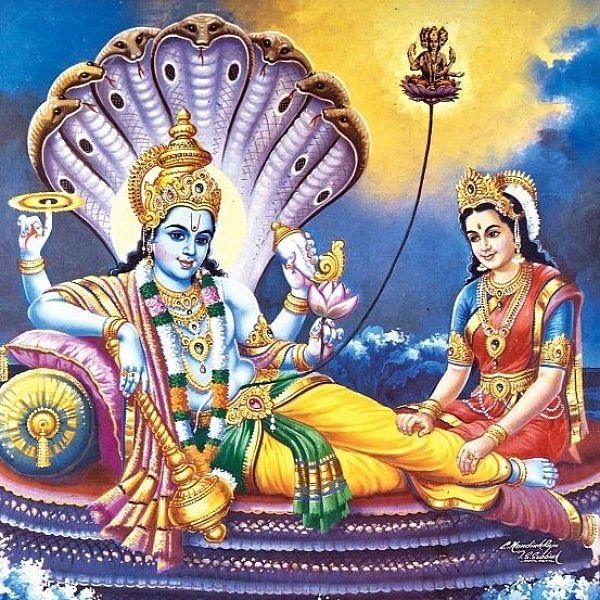
SLOKA-14:
SEVENTH ADHIKARAM OF SRTS: MUMUKSHUTHVAADHIKARAM
MEANING: Moksham is the ultimate desired goal, when one performs kaimkaryam to the Timeless Lord, who is never ever separated from His Devi, MahA Lakshmi. This Moksha Sukham is perennial and will be growing forever for the one, who has been blessed with Moksha Sukham. In contrast, the pleasures enjoyed in the SamsAric world are inherently perishable and do not last long. Our AchAryAs evaluated both these kinds of Sukhams and concluded that Moksha Sukham is by far the best and instructed us to seek it. Our AchAryAs with the sole goal of uplifting others from the SamsAric sufferings have blessed us with knowledge about the three tatthvams (Tatthva Jn~Anam) so that we can disengage our indhriyams from insignificant pleasures of this SamsAric world and set our goals on seeking the lasting pleasures of Moksham.
The key passages of the Paasuram are: “navinRavar nal aruLAl, pulankaLai venRu Perum payan veedinai vENDum” (Through SadAchArya UpadEsam, the chEthanam controls its sensory organs and seeks the Moksha Sukham).
This chapter of SrImath Rahasya Thraya Saaram (SRTS) is about the generation of desire for Moksham in the Chethanams. Through the recitation of and reflection on the deep meanings of AshtAkshara MahA manthram, the ChEthanam banishes pravrutthi dharmams and engages in pursuit of nivrutthi dharmams and becomes Mumukshu or the one desirous of gaining Moksham, liberation from the cycles of repeated births and deaths in this SamsAric world.

The Sanskrit slOkam passage echoing these thoughts in SRTS is: “niravadhi mahAnandha BrahmAnubhUthi kuthUhali DhaivAth jihAsitha Samsruthi: bhavithA”. (With BhagavAn’s anugraham, the ChEthanam becomes desirous of enjoying the limitless, great bliss of MokshAnubhavam and becomes a Mumukshu).

Courtesy: Oppiliappan Koil. Sri. V. Sadagopachariar


